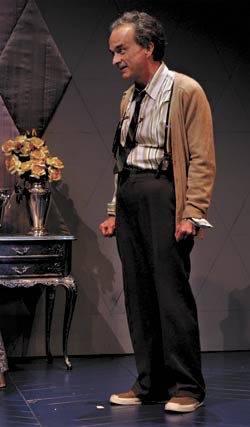DAVID PICHETTE is my favorite actor. When I call him up to tell him this, he’s wary.
“What is this about, again?” I explain that my editor wants me to write about my favorite actor and, seeing as how Pichette’s appearing in David Hare’s Stuff Happens, opening this week at ACT, it seems like a good time to…
“I see.”
A pause, then: “This isn’t some sort of award?” I tell him that no plaque will be involved. “That’s good. I appreciate the gesture, but I don’t really go in for awards.” I ask why. “They’re all lies. There’s no such thing as a best performance or best actor. Every show you work on, your peers are better than you are at something, and you’re better than they are at something. The idea of a best-actor award is ludicrous.”
Now, don’t you want your favorite actor to talk like that?
Small, dark, and unapologetically cerebral, with a high forehead, prominent nose, and crafty eyes, Pichette’s never been a leading-man type. “When I was starting out, I assessed myself. My voice was clear and distinct but not particularly attractive,” he says. “I had a flexible body but not a commanding presence. But I always have had an abundance of imagination and a certain relentless pursuit of what I want. I want to get it right.”
He came to Seattle in 1982 and began working with “this unofficial Seattle acting ensemble, John Aylward and Bob Wright and Lori Larsen, people who were all so good and so adept that it demanded a different level of attention. That made me who I am.” Pichette is probably best known as an ensemble player in small oddball roles—a neurotic puritanical priest in Quills, a half-comatose jazz musician in Side Man (both at ACT), Renfield in the Empty Space’s Dracula (snacking on bats with a weaselish ferocity).
“Roger Downey [the longtime SW theater (and everything else) critic] once said I’ve made a career out of playing grotesques and naives, and I’ve always enjoyed those,” Pichette says. “I like to go down to the lower taverns of my mind, retrieve one of the gnomes, and take him out for a walk.” The results are hilarious—raging cooks, snooty waiters, and officious priests, all dark-browed crabs with secret grievances, driven by the exasperated anger of intelligent men in a world of fools.
But the moments that stand out for me in Pichette’s career are when he’s been given roles of dramatic substance, like George in Burke Walker’s superb Of Mice and Men adaptation at the Empty Space several years ago. As he prepared poor, hapless Lenny for his death, Pichette’s George gave the big lug a couple of reassuring pats; then, after he pulled the trigger, his hand twitched convulsively, and I swear you could literally see George’s spirit die behind his eyes. Then there was Hare’s Via Dolorasa at ACT, a solo show about the tragic history of Israel/Palestine politics. Here, Pichette’s cerebral side was on display as he portrayed a dozen or so politicians, settlers, and thinkers on different sides of the conflict—all intelligent, all distinctive, and all entirely convinced of their positions.
He rarely plays the lead, but Pichette believes working with a good ensemble is just as enjoyable. “It’s the glee factor. When Stuff Happens was casting, I told them I didn’t care what the role was. I just wanted to get in on the fun.” It certainly sounds like fun; Hare’s acclaimed docudrama, compiled from transcripts and interviews, gives a disturbingly full behind-the-scenes portrait of the lead-up to the Iraq war. Pichette plays French prime minister, and war skeptic, Dominique de Villepin, as well as the abrasive BBC journalist Jeremy Paxman. He’s joined by such local heavy hitters as Julie Briskman, Peter Crook, Mark Jenkins, and Michael Winters.
That’s another reason why I inevitably enjoy his performances: He’s always having a visibly good time onstage. While Pichette is cast in the occasional dud, I’ve never seen him admit to it with his performance. Instead, he just gets better, his fellow actors lifted out of god-awful scripts like ACT’s Communicating Doors and Cheap just by proximity to his talent. (B-movie legend Peter Cushing once said that when he was given a bicycle, he always tried to pretend it was a Rolls-Royce.)
Pichette is one of a half-dozen or so Seattle actors who work fairly constantly, and he’s philosophical about the roles he didn’t get. “I’ve made a career out of being any number of directors’ all-time favorite second choice. But the funny thing is that when the roles went by—Hamlet’s gone, and no one needs a 55-year-old Cyrano—I suddenly realized that I don’t care. Other people can do those. Richard III is a little harder. I think I’ve got a great Richard in me. And I’m thrilled every time I do Scrooge in A Christmas Carol at ACT. I’ve done it seven or eight times, and that’s a wonderful opportunity to keep returning to a great role, to see what’s different about it.”
There’s a pause. I think it’s hard for Pichette to talk frankly about his ambitions, from modesty, from a characteristic focus on the role immediately in front of him, and because one of his greatest skills is to surprise you, to come at a role you’d never expect him to attempt in a way you’d never guess. Then he says: “The only real goal I have is to do Lear at 80, and do it right. Eight shows a week, don’t blow your voice, and you have to pick up Cordelia. I allow myself that one.” I’m guessing he does it. And I hope I’m in the audience.








